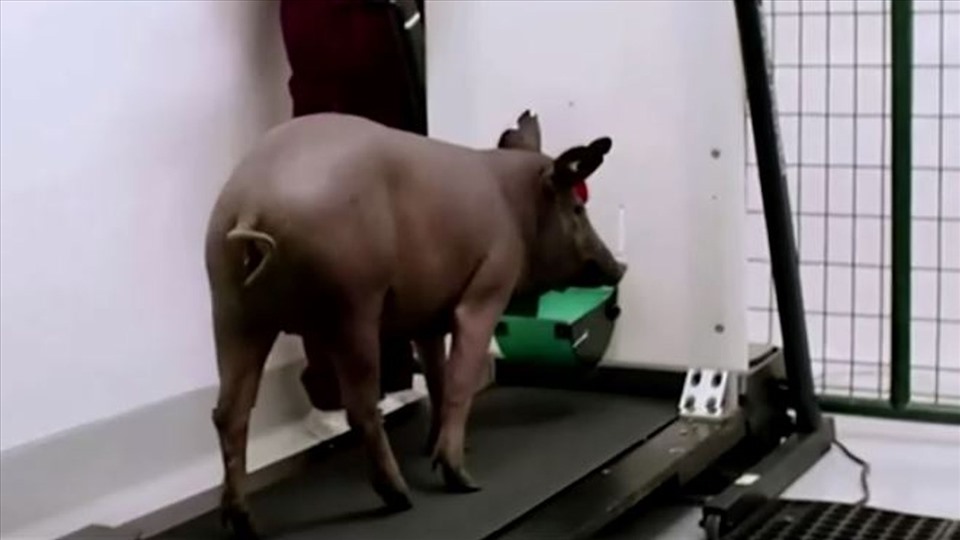Neuralink - công ty khởi nghiệp do Elon Musk đồng sáng lập đã cấy công nghệ không dây mới vào não của lợn với mục đích giúp đỡ những người bị bệnh về thần kinh nghiêm trọng, Sky News đưa tin ngày 29.8.
Tỉ phú Mỹ nói rằng, công ty Neuralink có 3 con lợn, mỗi con có 2 chip máy tính bằng đồng xu được cấy ghép vào não. Theo ông, những con lợn được cấy ghép "khỏe mạnh, vui vẻ và không thể phân biệt được với 1 con lợn bình thường".
Neuralink có thể dự đoán chuyển động các chi của con vật trong quá trình chạy trên máy chạy bộ với "độ chính xác cao" bằng cách sử dụng dữ liệu cấy ghép, ông Elon Musk nói.
Tỉ phú Elon Musk mô tả cảm biến - nhỏ hơn đầu ngón tay - là "một Fitbit trong hộp sọ của bạn với những sợi dây nhỏ bé".
"Tôi có thể có một Neuralink ngay lúc này và các vị sẽ không hề biết. Có thể tôi có nó" - vị tỉ phú doanh nhân nói một cách đầy bí ẩn.

Công ty có trụ sở tại San Francisco đã xin phê chuẩn từ Cơ quan Quản lý Thực phẩm và Dược phẩm Mỹ cho dự án, này. Dự án là nơi các nhà khoa học phát triển một mô cấy siêu nhỏ với hơn 3.000 điện cực, được gắn vào các sợi chỉ mềm có kích thước bằng 1/10 sợi tóc và có khả năng giám sát khoảng 1.000 tế bào thần kinh.
Các nhà khoa học kỳ vọng dự án này có thể đi theo hướng nào đó tới việc tìm ra cách chữa trị các bệnh về thần kinh như Alzheimer, sa sút trí tuệ và tổn thương tủy sống.
Hôm 28.8, Elon Musk nói rằng, thiết bị cấy ghép "có thể thực sự giải quyết những vấn đề này", trong đó ông có đề cập tới mất trí nhớ, mất thính lực, trầm cảm và mất ngủ.
Cuối cùng, nó cũng có thể liên kết con người với trí tuệ nhân tạo.
Tỉ phú điều hành Tesla cũng từng cảnh báo về những rủi ro của trí tuệ nhân tạo (AI) nhưng hôm 28.8, ông nói rằng thiết bị cấy ghép sẽ "đảm bảo tương lai của nhân loại như một nền văn minh có liên quan tới AI".
Các thử nghiệm đầu tiên sẽ tập trung vào những bệnh nhân bị liệt hoặc liệt 2 chi dưới, theo bác sĩ phẫu thuật trưởng của Neuralink - Tiến sĩ Matthew MacDougall. Ông không nêu khi nào các thử nghiệm sẽ bắt đầu.
Hầu hết các nghiên cứu tiên tiến về kết nối não bộ và máy tính được thực hiện trên động vật do những thách thức về an toàn và rào cản quy định ngăn cản các thử nghiệm lớn hơn trên người.
Năm 2019, tỉ phú Elon Musk nói rằng, ông hi vọng được sự chấp thuận của cơ quan quản lý với các thử nghiệm trên người vào cuối năm nay. Dù nhiều nhà khoa học cho rằng việc đọc sách và kích thích hoạt động của não bộ ở con người là có thể thực hiện được nhưng họ cũng nhất trí rằng lộ trình thời gian mà ông Elon Musk đưa ra là không thể, theo Sky News.








